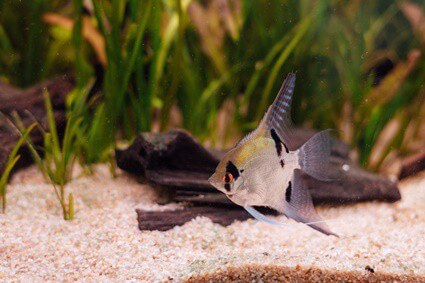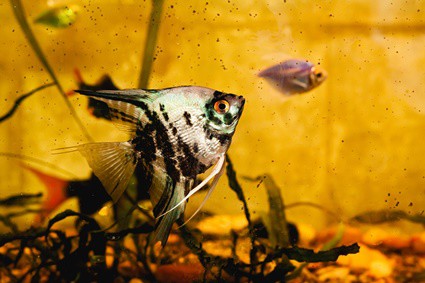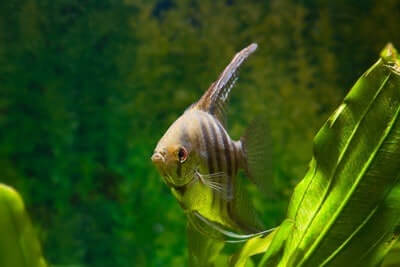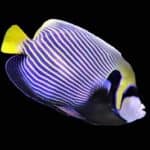Yes, angelfish sleep. They do so by reducing their mobility and becoming very still. They don’t become unconscious but limit the amount of energy they expend.
At nighttime, angelfish stay at the bottom of the aquarium, and their physical stripes will fade slightly. This enables them to recoup energy and heal their bodies.
If angelfish sense activity or feel threatened, they’ll immediately become alert.
Because angelfish are such light sleepers, they don’t experience REM cycles. They don’t dream or lose awareness of their surroundings because they’re prey animals.
They couldn’t detect and escape predators if they entered a deep sleep. If an angelfish stops moving but doesn’t float belly-up, it’s simply resting and recuperating.
Do Angelfish Sleep?
Angelfish do sleep, just not in the same way as mammals or humans. Instead of entering a deep, unconscious sleep, angelfish reduce their activity and stop reacting to most stimuli.
During this time, angelfish will float along with the currents of the water. Small movements of their fins may occur to correct their course. However, the fish won’t:
- Swim actively.
- Interact with other fish.
- Eat food.
- Respond to light or movement unless feeling threatened.
The stripes on the body of the angelfish offer the most compelling proof of its sleeping ability.
As the fish’s metabolism slows, it’s unable to maintain its bright colors. The stripes fade slightly at this time but will brighten up later when it awakens.
Do Fish Sleep Like Humans?
When humans sleep, we progress through multiple stages of unconsciousness.
One of these stages includes deep sleep or the REM cycle. Fish don’t experience REM sleep. They don’t lose consciousness while they rest, nor do they dream.
Some fish bury themselves in the sand while they sleep. This helps them to absorb melatonin better and maintain a strong sleep cycle.
While angelfish don’t bury themselves in the sand or gravel, they reduce their activity to near zero.
An angelfish remains partly awake as it sleeps. In other words, it’s a light sleeper. It’ll use this time just like every other creature. Its body will begin to heal, improve brain function, and recoup energy.

How To Tell An Angelfish Is Sleeping
It’s easy to look at a motionless fish and wonder if it’s dead. You may even attempt to help the fish, only to see it suddenly return to life.
There are several indicators for identifying a healthy, sleeping angelfish. These include:
Angelfish Not Moving, But Not Belly-Up
If a fish is dead, it will turn belly-up. It may immediately float to the top of the tank or rise to that point slowly. A sleeping angelfish will not be inverted, remaining right-side-up and almost entirely still.
Color Change
A dead angelfish will have fogged eyes and a grey appearance. If it’s passed recently, this change will be gradual.
However, a sleeping angelfish will not have any changes to its eyes. Its stripes will fade slightly, and its color will dim. However, it will not appear ashy or grey.
Angelfish Resting On The Bottom Of Tank
The bottom of your tank will see less activity. That’s why they swim to the base, near the gravel, and stay there. Other fish can swim and interact above it without disturbing it.
Will Not Attract Other Fish
As the angelfish sleeps, most other fish will ignore it. This is a good sign, as the rest of the life in the aquarium goes about its business.
Other tank occupants might investigate the body as a food source if the fish is dead.
Do Angelfish Sleep Upside Down?
Angelfish don’t sleep upside down. If a fish has turned belly-up, it’s ill or has already died.
When an angelfish sleeps, its swim bladder will remain in perfect condition. This helps the fish to maintain its balance and equilibrium as it’s suspended in water.
This only changes when the fish dies or has its swim bladder damaged by an infection.
Do Angelfish Sleep On Their Sides?
Angelfish don’t sleep on their sides. This is a quick way to tell if your fish is ill or has damage to its swim bladder. It needs veterinary attention if it starts floating on its side or swimming sideways.
Do Angelfish Move When Sleeping?
Even a resting fish may create tiny movements. This is intended to correct its course as it floats along and keep water flowing over its gills.
Since angelfish must absorb oxygen from the water, the flow is consistent. In a well-aerated tank, the fish will need to move less often.
Since it’s not entirely unconscious, the angelfish may:
- Twitch its fins slightly.
- Flick its tail once or twice.
You may notice your angelfish suddenly moving in one direction when you turn on the lights. This happens because your fish is startled out of its sleep.
Give the fish time to assimilate to the sudden change, and it’ll start acting normally again.
How Long Do Angelfish Sleep?
So far, there’s no concrete scientific study that answers this question. When an angelfish sleeps, its inactivity and immobility are not consistent. That makes it hard to tell. However, there are things we know about a fish’s sleep cycle, including:
- They may ‘wake up’ several times to check for activity or respond to false alarms.
- They may sleep in short bursts, waking up to check their territory or fry before returning to sleep.
- The angelfish may seem awake the entire time since it moves its fins slightly to correct its floating course. In actuality, it’s just sleeping.
The angelfish’s resting period could be as short as a few minutes or as long as a few hours.
Angelfish Sleeping Habits
Every angelfish is different and will create its sleep cycle. However, there are a few habits that are consistent for all fish.
Angelfish Usually Sleep At Night
Your fish will prefer to rest once their tank is dark. In the wild, this indicates nighttime has arrived. For species of fish that live in or around coral or in shallow waters, they’ll struggle to see in total darkness.
This makes it far easier to hide and sleep during this time, when predators may be more active. Since angelfish falls into this criterion, they will likely settle down for the night.
Angelfish Sleep With Their Eyes Open
Like some mammals, including horses or dolphins, angelfish do not close their eyes as they sleep. Instead, the eyes remain open to take in movement and light. This allows the angelfish to detect danger and react more quickly if needed, even when resting.
Angelfish Slow Down Their Metabolism
To save energy and help recoup their body’s strength, angelfish slows their metabolism as they sleep. It’s the same as a human’s heart rate evening out and slowing down as we sleep.
Your angelfish will digest, breathe, and move blood throughout its body at a slower rate. This metabolism change helps the fish take a break and regenerate as needed.

Angelfish Do Not Dream
According to a study in Physiology & Behavior, fish do show any rapid eye movement as they sleep. This strongly suggests that fish do not dream. Even when they’re at their most restful, they do not enter a REM cycle or deeper stages of sleep.
What Do Angelfish Need To Sleep?
Like all animals, your angelfish will sleep when it’s tired enough. However, this may be hard if its tank conditions aren’t set to the fish’s comfortable range. That will stress the fish out and make it feel too unsafe to sleep. To help your fish rest properly, you should:
- Keep a water temperature between 78° to 80° F.
- Give the fish tank that’s between 20-55 gallons.
- Avoid adding too many fish to the tank. Otherwise, the fish may feel overcrowded and threatened.
- Keep the fish well-fed. Otherwise, they may try to scavenge at all hours.
- Separate aggressive fish. They might antagonize each other, especially when one is trying to sleep.
Angelfish may not sleep like humans, but they still need sufficient rest.







